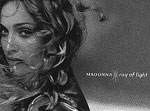

Ray of Light
Maverick/Warner Bros.
At first, the idea of Madonna recording an electronica album seems like a good one. After all, electronica, as a genre, could use something of a public face (when Keith Flint of the Prodigy is as close you've got, it's time to cast around for a new image) and human personality, something Madonna's got to spare. Madonna, on the other hand, could use a dose of relevance. The hit "Take a Bow" and the film Evita plunged her into a world of stale balladry and critical irrelevance, and electronica's been touted for the last two years as the Next Big Thing in music. Plus, electronica's deeply embedded to disco and synth-rock, which is where Madonna got her start, musically. So while not exactly a return to form (does Madonna really have a form to return to?), electronica would seem to promise at least familiar territory.
It's in this context that we get Ray of Light, the Madonnatronica record, and it's kind of a disappointment. Produced mostly by Madonna and electro pioneer William Orbit, the album has definite shades of electronica running through it, but the little bleeps and thumps running under the lyrics serve mostly to dress up less-than-interesting songs that don't sound all that different from the sort of material Madonna's been putting out lately. There's not even the kink of Erotica to liven things up.
What there is, sort of, is a degree of introspectiveness that one doesn't usually expect from or associate with Madonna. Always a better writer than she's been given credit for, Ray of Light seems to constitute an attempt to drop her masks and let the listener in on her life. When the first lines to any superstar's record are "I traded love for fame/Without a second thought," you know that what you're hearing is supposed to be some under-the-greasepaint confessional kind of material. The song "Little Star" seems pretty clearly about and for Madonna's new daughter, and the album's full of accounts of how lonely it is at the top.
But while it never sounds like whining, it's hard to know why we're supposed to care about the superstar in the first place. She's certainly not giving us the grooves she used to - electronica, despite its origins in dance music and the club culture it's a part of, isn't really the kind of dance music Madonna is used to, or even all that good at. Listening to Ray of Light, you wish she'd just let up a little and give with a decent beat or two.
Not that Ray of Light is a disaster by any means. The title track comes close enough to the dance-pop Madonna does best that anything she's done recently, even if it goes on too long, and the schlock-trip-hop "Candy Perfume Girl" isn't without its moments of fun. Best of all is the single "Frozen," that begins to hint at what a better fusion between Madonna and electronica might sound like.
Because fusion is as close as Madonna's ever going to get to any particular style, having invested too much in the creation of her own musical personality to risk any kind of full-on reinvention: she can alter her sound, but it still has to be recognizable as Madonna. One can only imagine what Ray of Light might have sounded like if it had been in collaboration with trip-hop visionary Tricky. They might have had fun, what with Madonna's multiple popular identities and position as the most important woman in pop music, had Tricky been allowed to run Ms. Ciccone's vocals through his own paranoid, insular sense of the world. But that sort of thing would have been too big a risk, and while Ray of Light is an interesting experiment, it's doesn't take enough chances to even risk failure. It's just another Madonna album, and these days, that doesn't count for much.
- Stefan Betz Bloom
Copyright © 1998, The Oberlin Review.
Volume 126, Number 21, April 17, 1998
Contact us with your comments and suggestions.